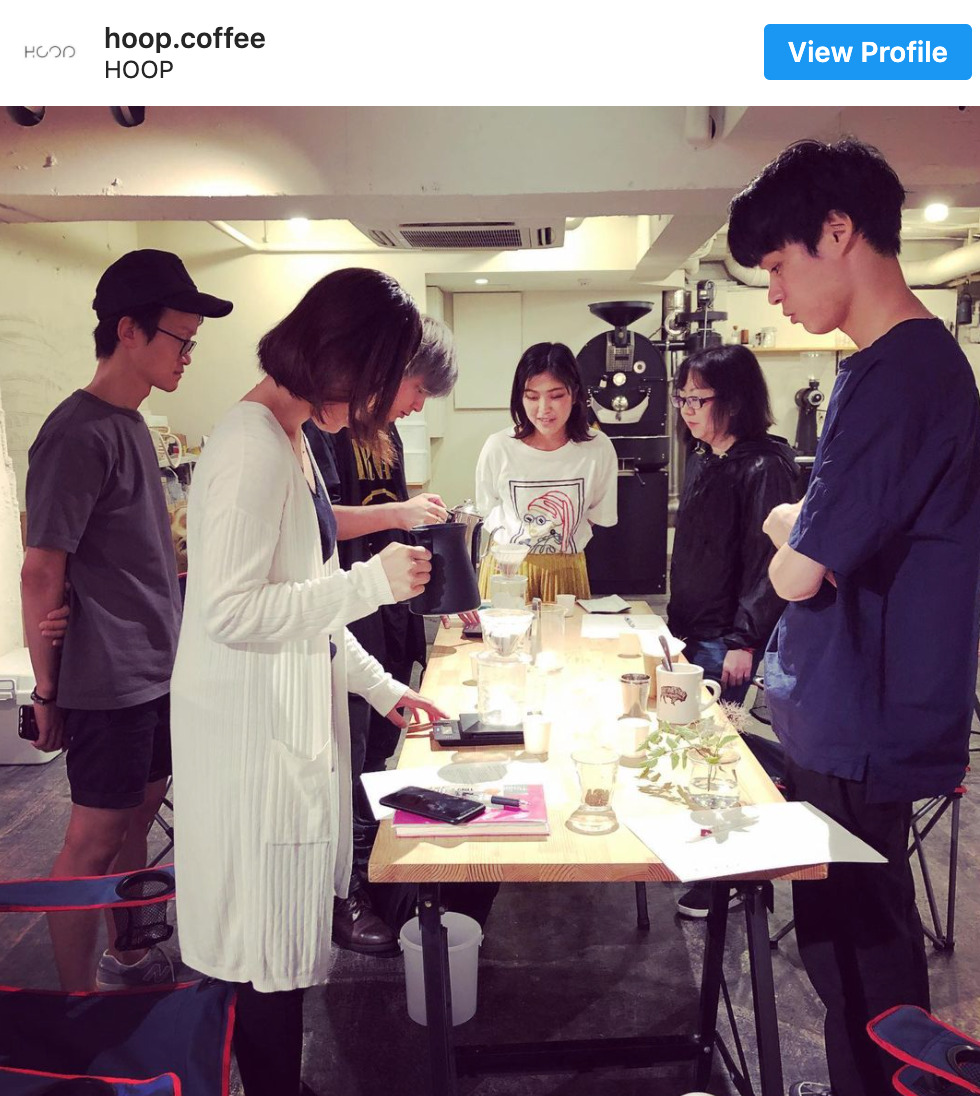
“Keen on the idea that pay is something you earn for yourself,” a liaison connects roasters and coffee shops nationwide / Yui Fujii
In April of 2019, “coffee brewing was in, and I feel I was really swept up in that trend.” Interested in cafés, she joined the staff at HOOP, a café which also sells coffee beans. In November 2019, following the establishment of TYPICA, a promoter of direct trade between coffee producers and brewers, she was spearheading efforts to expand into new markets. Now in her third year on the job, Yui Fujii tells us the story of how she found her niche.

During study abroad, discovering her ideal self
Although Yui had no particular interest in the beverage before, coffee really caught her attention during the winter of her university sophomore year. It happened during a four-month study abroad trip to New Zealand.
“When I went to a local café, I was taken by the way there seemed to be no barriers between customers and staff. It wasn’t stiff like Japan. Everyone was so open and friendly! I began to feel like I wanted to work in a café where I could build those kinds of relationships.”
She chose New Zealand for its “easy-going culture and abundant natural beauty.” During her homestay, she often found herself comforted by the warmth and friendliness of the people there.
“Two or three times a week, family members would hold potluck parties and watch rugby together. I got the impression that people in New Zealand spend a lot of time with family.
Even in daily life, for instance, by telling the driver “thank you” as they exit the bus, people regularly exchanged words of gratitude even with strangers. I found this heartwarming.”
She had put little thought into choosing a university, and she held no clear vision for her future. For Yui, New Zealand was the place where she first saw “the road she wanted to follow.”
“Thanks to the people there, I found more than just a job I wanted to do. I found a way of life and realized what kind of person I wanted to become.”

“Growth” becomes apparent over time
Yui returned to Japan, and when she went looking for a café to work at, she found “HOOP.” More than simply selling coffee beans, they saw coffee as a path to a whole new lifestyle (https://hoop.coffee/concept/ ). She was drawn to the concept. However, when Yui first started working there part-time, she suddenly found herself in a perplexing situation.
“Early on, Mr. Goto, the manager, asked me “How much do you want to be paid?” He went on, speaking very frankly, “Your pay is what you earn for yourself. So, if you’d like all of the money from the sales you make, that’s OK (even if it’s a lot)!” I was at a loss for words.” She laughs. “Since Mr. Goto was fully transparent with me about things such as the amount of daily sales, the cost of rent, and labor expenses, I feel I started to develop a sense of ownership in my work.”
Although she was working part-time, the expectations placed on her were no different from that of a full-time employee. In addition to the fact that HOOP was located underground, its sign was very small, and the shop was easily overlooked by potential customers. Yui was asked to think about what she should do at times when no customers came.
“To improve our visibility, I organized tasting sessions, built a stand to display our beans, and made our sign bigger…. With Mr. Goto’s support, I came up with various ways to boost profits. At first, there didn’t seem to be much interest in the tasting sessions. However, when I actually held the events, I was able to speak with the customers who came, and we even gained some new regulars. I was thrilled! The manner in which I worked was largely left up to me. Perhaps, that’s why I often found it difficult to handle all the problems I was asked to solve. However, I know that I grew over time, and I think it was a wonderful experience.”

Through “hardship,” an opportunity to grow stronger
Why then, after “developing such positive relationships with customers and enjoying life as a barista,” did she quit HOOP and decide to work at the fledgling TYPICA?
“I was passionate about coffee. Also, I was inspired by the uncompromising way in which Ayane Yamada lived her life as a working mother. I felt that by working with her I could deepen my understanding of the coffee business. I wasn’t entirely certain what kind of work I would do at TYPICA, but I was drawn to this unfamiliar world, and I felt I was ready to try new things.”
First, Yui was tasked with pursuing expansion into new markets. One by one, she called the roasters and coffee shops that used coffee beans throughout Japan. Where there was interest, she visited these enterprises in person to expand her business network. Most of the places she visited expressed doubt about her proposals. “It’s an interesting idea in theory, but is it really feasible?” “It would be great if we could pull it off, but that would be difficult.”
“There was support from Amsterdam, where our headquarters is located. However, single-handedly seeking out new clients for an organization that had only been founded about a year prior was much harder than I expected. Even though I knew little about the world of coffee, I had to make cold calls to people who were well-known in the business. These phone conversations were terrifying for me.”
It was a harsh reality that about a year after graduating from university and without any specialized skills to speak of, it was as if she had been tossed into the middle of a vast desert all by herself. It seemed as if she might not be able to produce the results that were expected of her. She couldn’t see any way to break free of this difficult situation. Even as she felt she might be crushed by the weight of the burden she carried, Yui was desperately searching for a way to make progress.
“Even if I had given up at that point, without making any meaningful contributions, it would not have been any benefit to me. It was a desire to learn what I was capable of that really kept me going.”
Yui heard that TYPICA founder, Yamada, had expressed concerns about how things were going with her. Shortly after, Yui decided to be completely honest with Yamada about her state of mind, that she was “afraid.”
However, as if to crush Yui’s childish hope for words of encouragement, Yamada’s response was severe.
“Even if you don’t like it sometimes, this is your job, isn’t it? This isn’t some sort of club. You’re being paid for this. Even at an ordinary company, it would be unthinkable not to produce some sort of results, as if you’ve done nothing, when you’ve been told to get something done urgently.”
Yui thinks back. “After being treated so bluntly, I realized something. It was naive of me to think that I could whine and complain and expect sympathy. Such naivety would not be tolerated here. Perhaps it’s that I had been used to depending on those around me when things got tough. Certainly, I had often relied on the advice of others. But, hearing those words gave me the opportunity to come to terms with my own weaknesses. From that point forward, I feel I also found inspiration in the questions with which Mr. Goto once challenged me. ‘When you’re working, does it matter what your supervisor thinks of you? Does your supervisor’s opinion have anything to do with whether or not you should keep going?’ ”

Searching for her niche
Throughout her six years of junior and senior high school, Yui spent most of her time playing softball. There were even games and practices on weekends. Each year, she had around three days off for summer vacation and three days off for the New Year’s holiday. In both junior and senior high school, she participated in tournaments including national championships and the inter-high school championship.
Yui’s specialty was the drag bunt, and she considered herself quite good at it. On her team of 30, she spent much of her time on the bench. Still, she was their secret weapon, rising to the occasion as a pinch hitter when needed.
“I wasn’t able to hit well or make any home runs or anything like that, and I wasn’t good at fielding either. In fact, I felt like I was particularly bad at fielding, so much so that during the games, I used to stay where my coach couldn’t see me to avoid being put on defense.” She chuckles. “After pondering questions like ‘What can I do?’ and ‘How can I support my team?’ I realized that bunting was the answer. For this reason, I didn’t practice anything but bunting, and I was always trying to find ways to improve my bunting technique.”
‘To go to nationals,’ that was the team’s goal, and it was Yui’s personal goal as well.
“Of course, I would have loved nothing more than to have been able to actually go out on the field myself, but we practice together to make the best team possible, and it’s the top players who get to play in the game. Seeing things this way, I never felt any frustration over being outdone by my teammates. Rather, I genuinely admired those who could hit a home run, and I was happy when they made a hit for the team.”
She found that sharing the ups and downs of sports life with her teammates was uplifting.
“I think the relationship we shared, the way we supported each other by giving advice or being practice opponents for one another, was a good fit for me. But, I honestly don’t recall much “hardship” from my days in junior and senior high school. My friends may have called me “careless” or something like that from time to time, but I never let these sorts of things get to me, and I’ve already forgotten about all that anyway.” She laughs.

Finding her center
Today, Yui works as a community manager, supporting the development of the roaster and café community throughout Japan, listening to their needs and ideas, and acting as their ambassador to coffee bean producers throughout the world.
“I still need a lot of help and advice from those around me, so I want to get to the point where I’m able to give back. I think I can get closer to achieving that goal by performing well at the tasks I’m assigned, so I really want to focus on the work set out before me. I still can’t escape the sense that I’m receiving my pay from the company, so I would really like to get to the point where I truly feel like I’m earning my income for myself.”
Yamada once told her, “I didn’t hire you to support me. I want you to be proactive in discovering your own role here.” These words still live within Yui today.
“Surrounded by the voices of countless others, the challenge before me is to find a voice of my own. As part of a team, as part of TYPICA, and as an individual, I want to find my center, cherish it, and remain true to it in my dealings with others.”
Of the ever modest Yui, Goto has this to say.
“She’s wonderful for her sincerity, her enthusiasm in her work, and her earnestness in the pursuit of continuous improvement. As a young graduate, she faced numerous obstacles in her part-time job. I have nothing but the deepest respect for her, for even as she made mistakes along the way, one-by-one, she steadily overcame every challenge she faced. Today, Yui is such an important member of the team I think it’s safe to say that ‘TYPICA would not be 100% without her.’ ”
Just like the bunt from her softball days, Yui is seeking out her niche at TYPICA as well. Surely, Yui will continue to serve as an example of how dedication and hard work are key in becoming an irreplaceable part of the team. (To be continued).
Photo:Kenichi Aikawa
